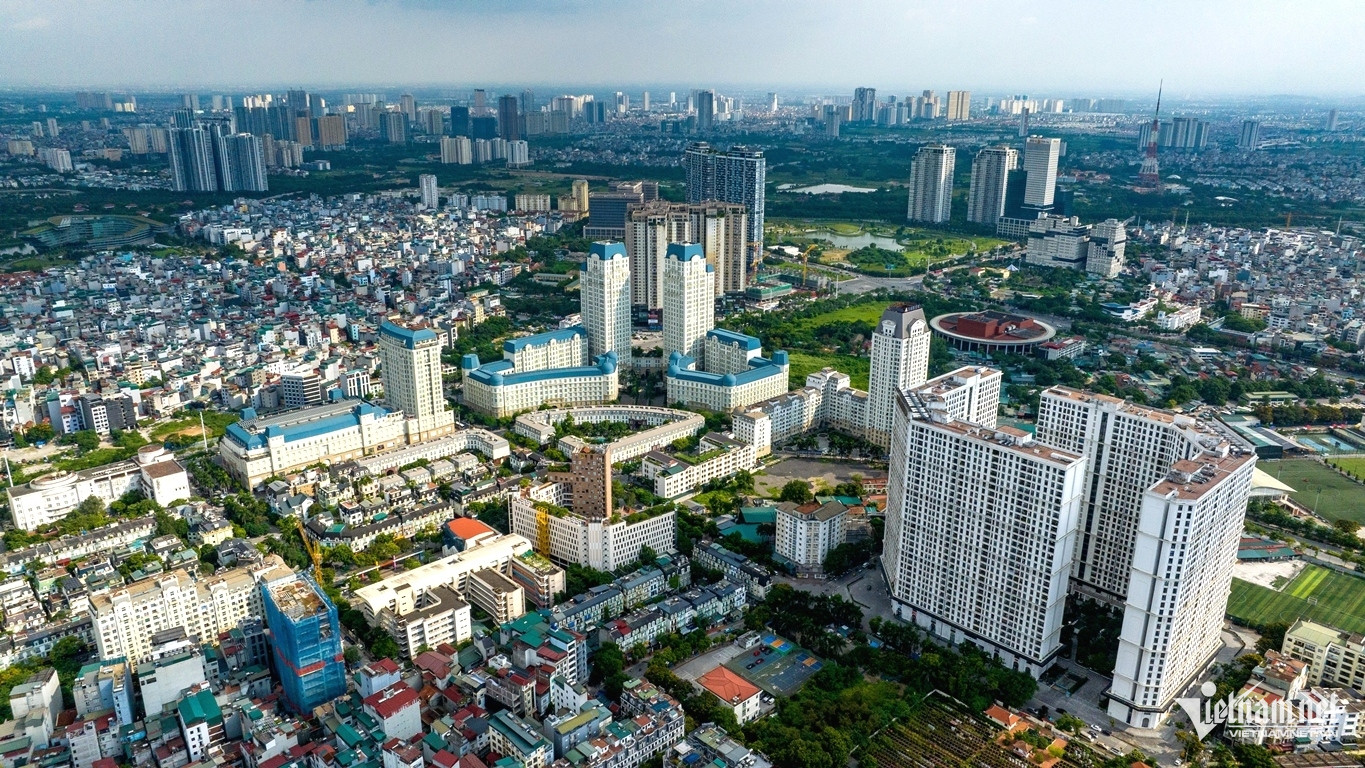Distinguish between speculation and investment and real needs
In the draft Resolution on the mechanism to control and curb real estate prices, the Ministry of Construction is seeking opinions from ministries, branches and agencies, proposing to apply a loan limit of no more than 50% for loans to buy a second home, a loan limit of no more than 30% for loans to buy a third home or to reserve at least 20% of the total number of commercial housing construction projects for affordable housing, depending on the locality's decision.
Speaking with VietNamNet reporter, Vice President of Vietnam Real Estate Association Nguyen Van Dinh assessed that the goal of tightening lending is to prevent speculation and price inflation, but if not careful, it will affect people with real needs, such as families with many children, parents who want to buy more houses for their children to live in.
According to him, it is necessary to clearly identify what is speculative and investment demand and what is real demand, avoiding confusion that will affect buyers' real housing demand.
“The solutions proposed should not be local or haphazard, but require a synchronous regulatory system, many different tools and methods to target the objects that need to be controlled. To do this, it is necessary to prepare a unified database. All real estate transactions should be conducted through a transaction center for easy monitoring and control of fluctuations,” said Mr. Dinh.
Regarding the proposal to allocate at least 20% of housing projects to the appropriate price segment depending on each locality, Mr. Dinh commented that this is the right direction but still "half-hearted", not going to the bottom of the problem. According to him, it is necessary to include a mandatory mechanism for localities to seriously implement, to avoid repeating the situation like with social housing today.
He cited the regulation of reserving 20% of land fund in projects to build social housing that has existed for a long time, but in reality it is very difficult to implement, causing the supply of social housing to remain scarce.

Experts say that to reduce real estate prices, a comprehensive solution is needed to regulate the market. Photo: Hoang Ha
Mr. Pham Duc Toan, General Director of EZ Real Estate Investment and Development JSC (EZ Property), said that limiting loans for buying second or more houses will directly hit real estate speculators, but the effect will not be great. The reason is that when credit is tightened, the market will have many ways to "dodge". Most investors and speculators have a relatively large amount of cash or own many other assets to mortgage for loans, not necessarily to borrow in the form of buying a house.
“This solution can only be applied to housing projects that will be formed in the future. As for real estate that already has a ‘red book’, it is very difficult to control because it is possible to borrow from banks through many different forms,” said Mr. Toan.
He analyzed that Vietnamese people have a habit of hoarding gold and land. When buying a house, many families often let their parents own the house, then transfer it to their children when they grow up. If loans for second and third homes are tightened, this policy can directly affect the legitimate needs of the people as well as the development of the real estate market.
Need to increase supply, create competition
Mr. Vu Cuong Quyet, General Director of Dat Xanh Mien Bac, said that the real estate market operates according to the law of supply and demand. When demand is high and supply is scarce, the price of any commodity, including real estate, will increase.
According to Mr. Quyet, limiting loans for second and third home purchases is an administrative measure. To effectively regulate the market, the State should use tax policy tools. Currently, land use fees are calculated based on market prices. Along with high land taxes, this causes investors' input costs to increase sharply. Along with that, the increase in construction material and labor prices also causes product costs to increase, pushing up the selling price in the market.
Mr. Quyet noted that, in parallel with tightening loans for commercial housing purchases as proposed, there needs to be a comprehensive solution to regulate the market. In particular, the most important solution is to increase the housing supply by simplifying procedures, removing legal obstacles... When the supply is abundant, housing prices will automatically decrease.
“It is necessary to promote the development of social housing, low-income housing, especially rental housing to reduce the pressure of buying a house. At the same time, there should be preferential policies on bank loan interest rates for first-time home buyers or low-income people,” Mr. Quyet emphasized.
According to Mr. Pham Duc Toan, to control the increase in real estate prices, it is necessary to develop two markets in parallel: commercial housing and medium-priced housing, social housing for low-income people and workers.
“When the supply of social housing increases, commercial housing is forced to compete on price, and the market will then self-regulate,” said Mr. Toan.
He cited that in some localities such as Hai Duong (old), where social housing is strongly developed, commercial housing prices cannot increase as high as in big cities like Hanoi or Ho Chi Minh City. Therefore, when issuing policies, the State should let the market self-regulate according to the law of supply and demand instead of applying administrative measures.
Vietnamnet.vn
Source: https://vietnamnet.vn/muon-ha-gia-bat-dong-san-quan-trong-nhat-la-tang-manh-nguon-cung-2450380.html


![[Photo] Closing of the 13th Conference of the 13th Party Central Committee](https://vphoto.vietnam.vn/thumb/1200x675/vietnam/resource/IMAGE/2025/10/08/1759893763535_ndo_br_a3-bnd-2504-jpg.webp)

























































































Comment (0)